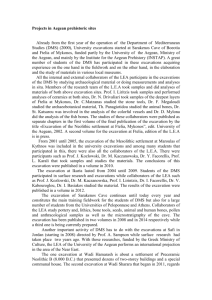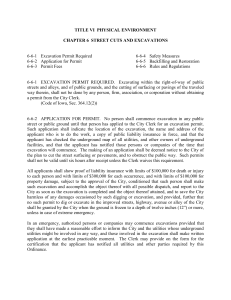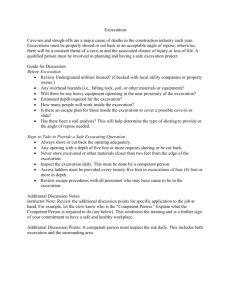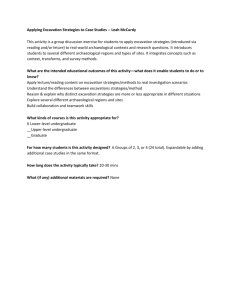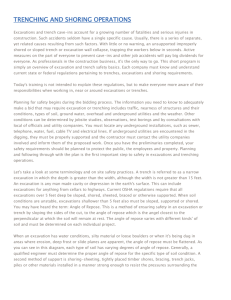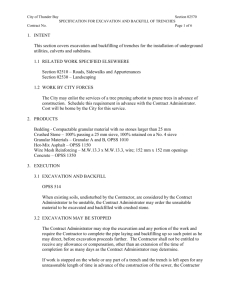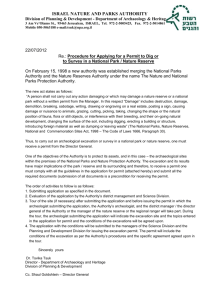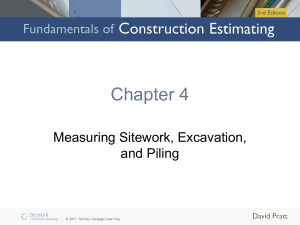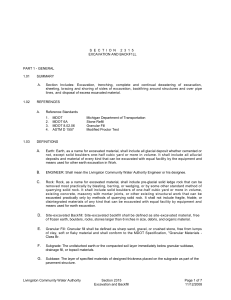Chapter 10: Pricing Excavation and Backfill
advertisement
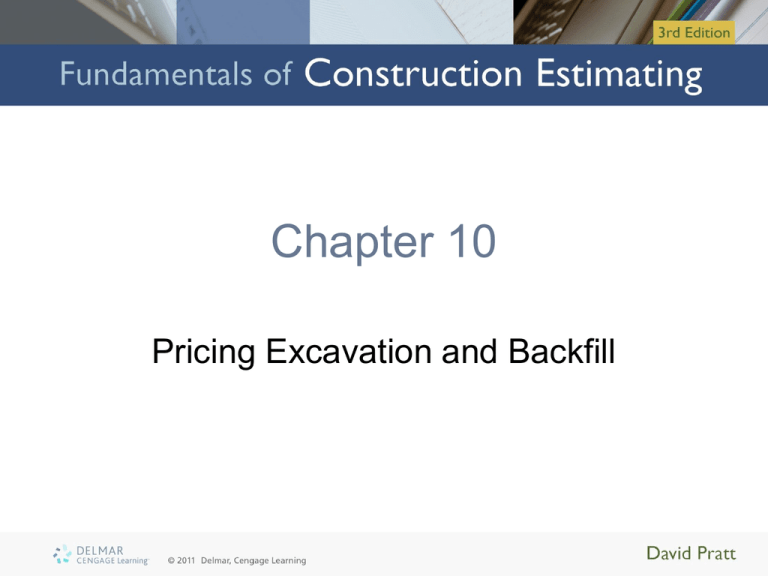
Chapter 10 Pricing Excavation and Backfill Objectives • Upon completion of this chapter, you will be able to: – Describe the job factors and the labor and management factors that influence the price of excavation and backfill operations – Use historic productivity rates to calculate the unit price of labor and equipment for excavation and backfill work Objectives (cont’d.) – Calculate the price of gravels and other backfill materials – Calculate trucking requirements for hauling excavated material and gravels – Complete the recap and pricing of excavation and backfill work using manual methods – Use Excel spreadsheets to price excavation and backfill work Excavation Equipment and Methods • Specialized excavation contractors – Concentrate on a single construction type: • Vast array of excavation equipment • Wide scope of work – Common activities: • • • • Site cut and fill operations Basement-type excavations Trench excavations Pit and sump excavations Excavation Equipment and Methods (cont’d.) • Equipment transportation expenses: – Priced on an item-by-item basis • Site cut and fill operations: – Equipment depends on project scale • Basement excavations: – Often performed with a track backhoe – Large basements: one or more track loaders Excavation Equipment and Methods (cont’d.) • Trench excavations: – Smaller trenches: trenching machines – Larger trenches: backhoes • Pit and sump excavations: – Mostly performed using backhoes • Hand excavation: – Rarely used Excavation Productivity • Job factors: – Type of material excavated or backfilled – Moisture condition of materials – Weather conditions expected – Site access and project size/complexity – Distance to haul materials for disposal – Availability of gravels and fill materials – Wage and price levels at the job location Excavation Productivity (cont’d.) • Labor and management factors – Quality of job supervision – Quality of job labor – Motivation and morale of workers – Type and quality of tools and equipment – Experience and records of similar past projects Excavation Work Crews • Labor price per unit of excavation work – Elements to consider: • Number of workers that comprise the work crew and their trades • Wage rates of trades involved • Probable productivity rate of crew or equipment they are operating • Productivity time factor Productivity Rates • Sources: – Provided in publications (e.g., Means Building Construction Cost Data) • Use with caution: general reflect ideal conditions – Also available from manufacturers – May be compiled from contractor’s own projects Figure 10.3 Productivity of Hydraulic Excavators (Delmar/Cengage Learning) Figure 10.4 Sample Data Record (Delmar/Cengage Learning) Excavation Materials • Mostly comprise gravels and fill materials: – Required to meet designer’s specifications • Backfilling • Base courses under slabs and paving • Pricing components: – Supplying material to the site – Spreading and compacting Swell and Compaction Factors • Excavated soil or gravel: – Less dense • Swell factor: – Occupies more volume • Compaction factor: – Allowance for extra material required to fill volumes with compacted material Calculating Trucking Requirements • Determine optimum number of trucks required to transport materials – Formula: • Number of Trucks Required = Unloading Time/ Loading Time + One – Example: Gravel Supply Pricing • Refer to Pages 234 and 235 Additional Examples • Excavation and Backfill Recap and Pricing Notes – Example 1—House • Refer to Pages 235 through 240 • Excavation and Backfill Pricing Notes – Example 2—Office/Warehouse Building • Refer to Pages 240 through 244 Summary • Many subcontractors perform excavation and backfill work – Most specialize in some aspect • Common methods: – Site cut and fill operations – Basement-type excavations – Trench excavations – Pit and sump excavations
